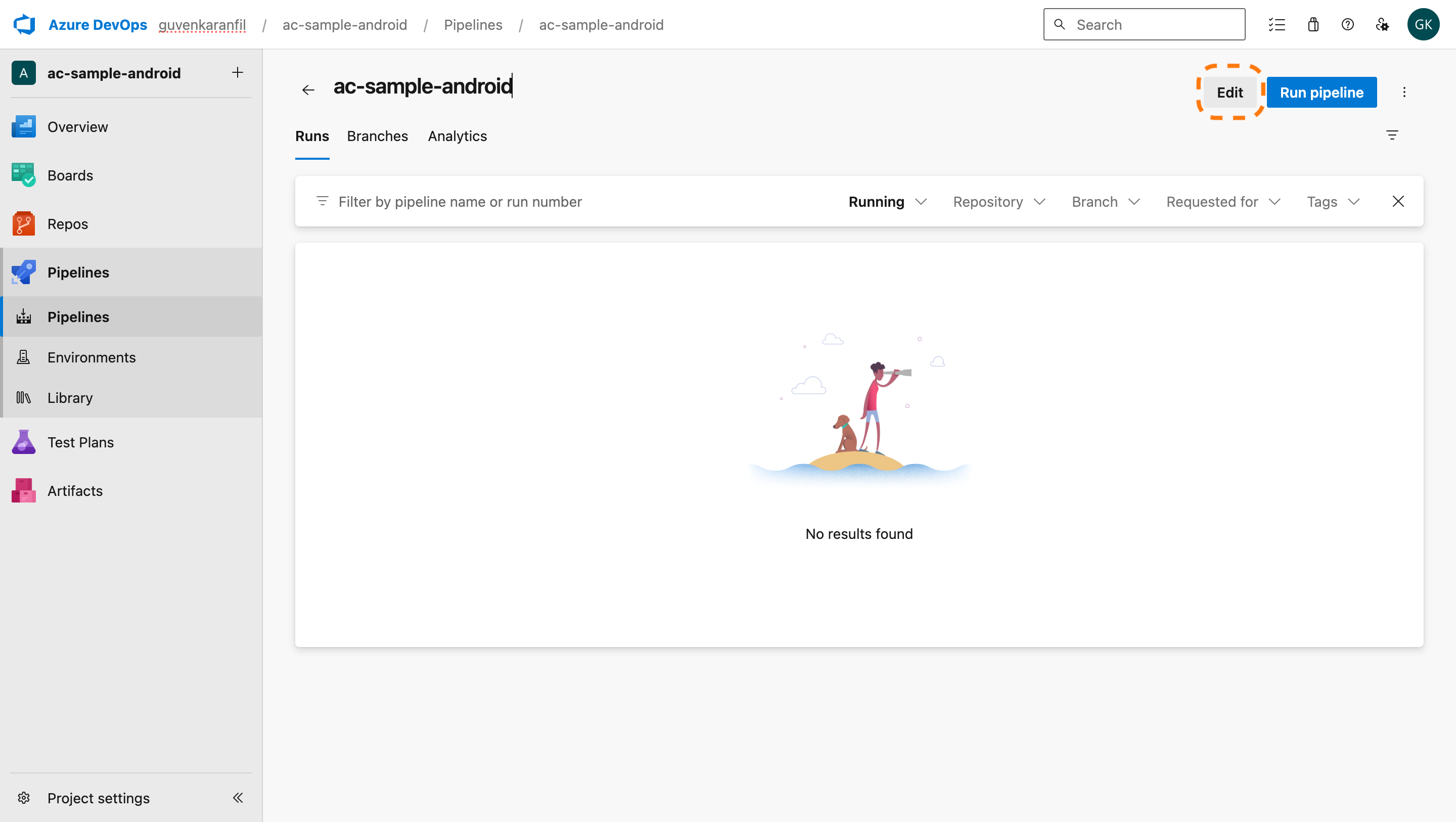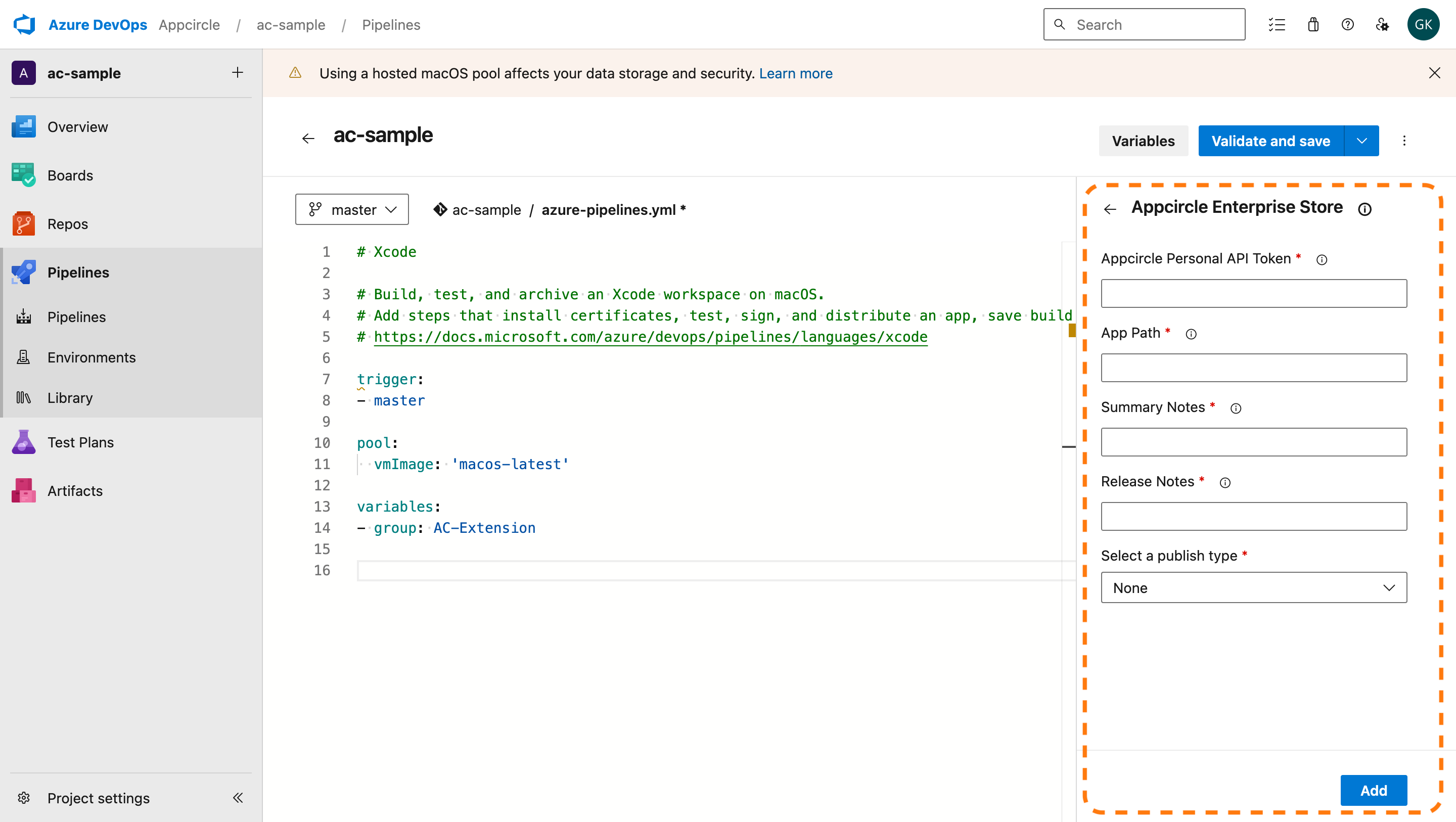Setting Up Appcircle Enterprise App Store in Azure DevOps Pipeline
Appcircle Enterprise App Store serves as your private mobile app store, allowing access to in-house apps through a customizable mobile storefront. The Appcircle Enterprise App Store extension enables you to upload your app to your personalized app store within Appcircle.
System Requirements
Compatible Azure DevOps Versions:
- Azure DevOps Services (cloud)
- Azure DevOps Server 2020 (on-premises)
- Azure DevOps Server 2022 (on-premises)
Compatible Agents:
Both cloud and self-hosted agents are supported.
- macOS 14 (arm64)
- Ubuntu 22.04 (x86_64)
Setup Appcircle Enterprise App Store
Refer to our comprehensive Enterprise App Store Docs for detailed information about: Enterprise App Store profiles, portal customization, portal settings, enterprise portal, portal reports, in-app updates and more.
How to Get the Appcircle Enterprise App Store Extension
Permissions
Before installing the extension, ensure you have the necessary permissions in your Azure DevOps organization. If you don't have permission to add extensions, you'll need to request approval from your organization administrator.
Installation
You can discover more about this extension and install it from here:

For details on how to install the extension, visit the Azure extension installation guide.
When visiting the installation guide, ensure you select the correct version of Azure DevOps from the dropdown menu at the top of the page. The available options include "Azure DevOps Services" and "Azure DevOps Server 2022" etc.
How to Add the Appcircle Enterprise App Store Task into Your Pipeline
1. Get a Personal API Token
For this extension to authenticate to your Appcircle, you need to create a Personal API Token, and use it in your task configuration.
You can follow the Generating and Managing Personal Access Keys page to create a Personal Access Key for a PAT.
2. Add Task to Your Pipeline
In order to install Appcircle Enterprise App Store Extension, follow these steps;
- Go to your pipeline, click "Edit" button on the top right corner.

- Inside your YAML file, search for "Appcircle Enterprise App Store" task.

- Complete the necessary input fields and then click the "Add" button.
3. Configure the Task
After filling out the required fields, the AppcircleEnterpriseStore@0 task will appear in your pipeline steps as shown below:
- task: AppcircleEnterpriseStore@0
inputs:
personalAPIToken: $(AC_PERSONAL_API_TOKEN)
authEndpoint: $(AC_AUTH_ENDPOINT)
apiEndpoint: $(AC_API_ENDPOINT)
appPath: $(AC_APP_PATH)
summary: $(AC_SUMMARY)
releaseNotes: $(AC_RELEASE_NOTES)
publishType: $(AC_PUBLISH_TYPE)
-
personalAPIToken: The Appcircle Personal API token used to authenticate and authorize access to Appcircle services within this extension. -
authEndpoint(optional): Authentication endpoint URL for self-hosted Appcircle installations. If not specified, uses Appcircle Cloud by default (auth.appcircle.io). -
apiEndpoint(optional): API endpoint URL for self-hosted Appcircle installations. If not specified, uses Appcircle Cloud by default (api.appcircle.io). -
appPath: Indicates the file path to the application that will be uploaded to Appcircle Enterprise App Store. The path can be specified in two ways:When Build and Enterprise App Store tasks are in the same pipeline: Assuming you are using Enterprise App Store task after a build step, you can use the output directory of the build step. For example:
- iOS:
$(Build.SourcesDirectory)/output/app.ipaor./output/app.ipa
- Android:
$(Build.SourcesDirectory)/app/build/outputs/apk/release/app-release.apkor./app/build/outputs/apk/release/app-release.apk
When Enterprise App Store task is a separate pipeline: Assuming you have published a build artifact in your build pipeline using
PublishBuildArtifactstask, you can get the artifact usingDownloadBuildArtifactstask into a specified directory and use it in the Enterprise App Store pipeline. For example:$(Build.ArtifactStagingDirectory)/app.ipa$(Build.ArtifactStagingDirectory)/app.apk
Make sure the path points to a valid application package file.
- iOS:
-
releaseNotes: Contains the details of changes, updates, and improvements made in the current version of the app being published. -
summary: Used to provide a brief overview of the version of the app that is about to be published. -
publishType: Specifies the publishing status as either none, beta, or live, and must be assigned the values "None", "Beta", or "Live" accordingly.
Ensure that this action is added after build steps have been completed.
If two workflows start simultaneously, the last workflow to reach the publish step will be the up-to-date version on the Enterprise App Store. If these workflows building the same package version, the first publish will be successful, while later deployments with the same version will fail.
Using with Appcircle Self-Hosted
Self-signed Certificates
Adding custom certificates is not currently supported in this extension.
If your self-hosted Appcircle server has self-signed certificates, the Azure DevOps agent that runs the pipeline must trust your Appcircle server's certificates.
Leveraging Environment Variables
Utilize environment variables seamlessly by substituting the parameters with $(VARIABLE_NAME) in your task inputs. The extension automatically retrieves values from the specified environment variables within your pipeline.
References
- For details on generating an Appcircle Personal API Token, visit Generating/Managing Personal Access Keys.
- For more detailed instructions and support, visit the Appcircle Enterprise App Store documentation.